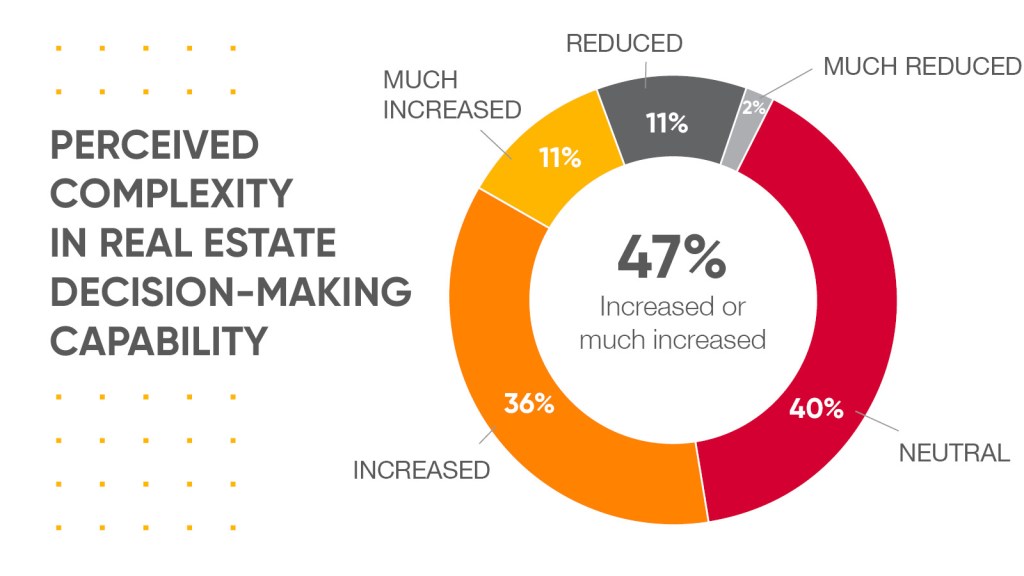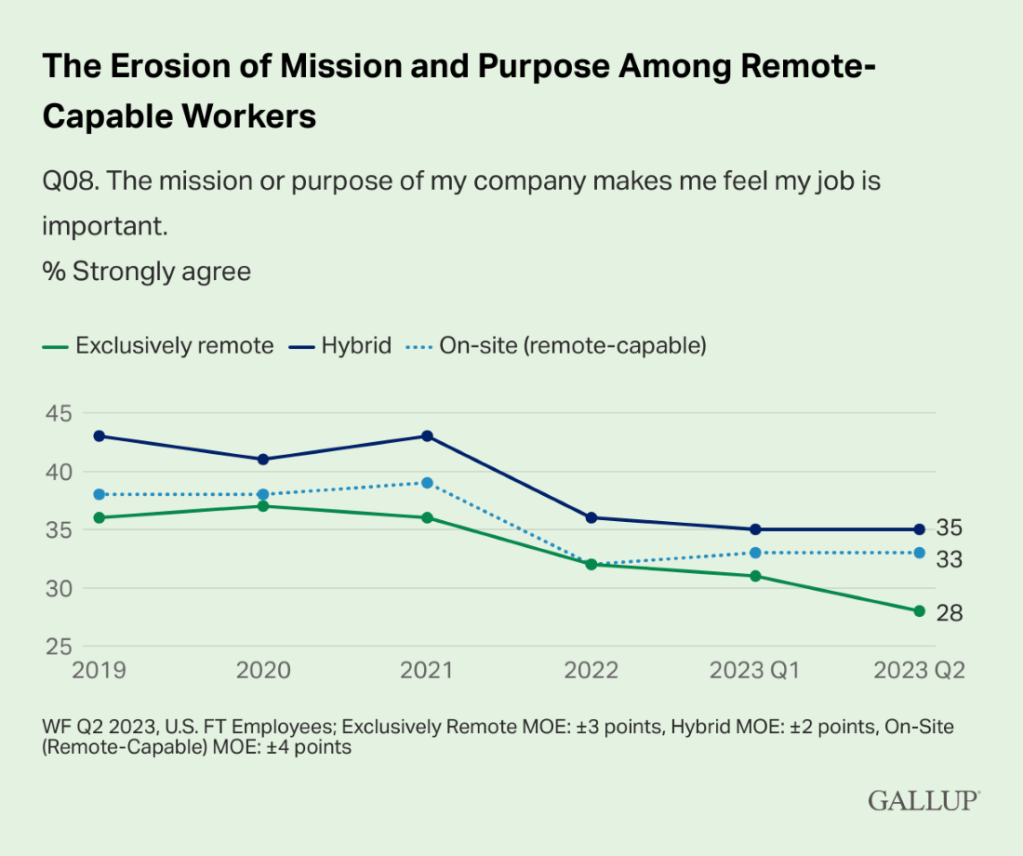Amid recent turbulence within the office market, certain elements persist unchanged. Office space continues to represent a significant portion of corporate expenditures, despite the availability of remote work options. While the complete ramifications of costs and benefits such as collaboration and productivity are yet to fully materialize, vacancy rates have surged to 17.5%, reported CommercialSearch. Influenced by factors like economic uncertainty and the adoption of hybrid work models, traditional office dynamics are undergoing a transformation. Shared office spaces, experiencing a compound annual growth rate of 19.7%, further challenge conventional norms.
Foreseeing future trends remains uncertain as companies grapple with transitions and prioritize employee flexibility. The ability to adapt is paramount in attracting talent and optimizing portfolios, leading some companies to downsize leases. Although certain firms uphold traditional attendance policies, the trend towards flexibility is unmistakable. Ultimately, adaptability emerges as a critical factor in navigating the significant shifts within the market.
The office market has experienced significant upheaval in recent years, but certain fundamentals remain unchanged. Office space continues to rank as the second-most costly item on a corporate balance sheet, underscoring its enduring importance despite the rise of remote work. While the full impact of these costs may not yet be realized, the benefits of office spaces, including collaboration, camaraderie and strategic productivity, remain critical to business success.
Complexity or Uncertainty?
The office landscape is undergoing a significant transformation to accommodate a new era of demand, but this transition towards a “new normalization” won’t be without its challenges. According to David Smith, there’s an expectation of a more consistent determination of square footage per employee as we move away from economic uncertainties and pandemics. However, this progression, although natural, will present its own hurdles. A recent Knight Frank Cresa survey reveals that the complexity of real estate decision-making is increasing, with factors like environmental, social and governance (ESG) concerns being particularly influential. Among potential relocation drivers, changes in workstyle and workspace quality rank high, alongside quantity and cost of space. Loyalty among employees also emerges as a significant issue, with Gallup reporting a decline in engagement levels, especially among exclusively remote workers.

Peter Kolaczynski, director of CommercialEdge, highlights the growing complexity of the decision-making process, driven by shifting expectations. Warren Hersowitz, sales lead for Yardi Kube, raises the question of whether office decisions will become more complex or simply more uncertain, given the prevailing economic uncertainty. The trend towards employee flexibility, notably remote work, appears irreversible, with shared spaces being considered as a potential solution to alleviate pressure. Overall, the office market is navigating a period of profound change, characterized by evolving needs, increased complexity and the ongoing impact of remote work dynamics.

Shared Space, Reimagined
The evolving desires of office workers are reshaping the landscape of office space, leading to a democratization of workplace environments. Decision-makers are reassessing space requirements in response to employees’ preferences, which are shifting away from traditional setups. The focus is now on enhancing collaboration, innovation and connectivity within the office to support productivity and team performance. This shift may lead to a de-emphasis on private offices in favor of more flexible, activity-based spaces with ample natural light and views. Landlords are adapting to these changing needs with innovative solutions like BentallGreenOak’s MIRO (a shorthand for Move-in-Ready Offices), which offers fully built-out, ready-to-use office alternatives tailored to small and medium-sized tenants’ flexible requirements. MIRO operates under lease agreements rather than memberships, distinguishing it from traditional coworking spaces.
This reflects a more democratic approach to space utilization, where companies are revising protocols and strategies to accommodate greater flexibility. Technology plays a significant role in optimizing this flexibility, with platforms like Yardi Kube empowering corporate users to manage flex-space operations efficiently and make data-driven decisions independently. As technology and flexibility become increasingly intertwined, questions arise regarding the evolving role of the office broker in this dynamic and rapidly changing market landscape.
The Broker of the Future
The increasing prevalence of technological resources in the commercial real estate sector prompts speculation about the role of brokers in the future. While some anticipate the possibility of brokers becoming obsolete, prevailing sentiment suggests otherwise. Technology is expected to reshape how brokers serve their clients rather than eliminate their roles altogether. Discussions on the “disintermediation” of brokers predate the COVID-19 pandemic, with technology seen as empowering brokers to enhance productivity and focus on the human aspects of the real estate business, according to the National Association of Realtors. Brokers offer comprehensive guidance beyond deal execution, encompassing workplace consulting strategies, employee preferences, space requirements, construction costs and scheduling.

Despite the evolution towards smaller, shared spaces and short-term leases, brokers remain indispensable due to their holistic approach and enduring client relationships. The future of brokerage hinges on providing personalized, practical solutions tailored to clients’ evolving needs. While technology continues to advance, the human touch and relational aspect of brokerage will remain pivotal in decision-making processes. Collaboration between brokers and clients will persist as markets undergo significant transformations, highlighting the enduring importance of broker-client relationships in navigating the evolving landscape of commercial real estate.
How Technology Informs Decision-Making
The advancement of technology is poised to revolutionize the roles of both real estate brokers and corporate users in the commercial real estate landscape. According to JLL’s Meaghan Elwell, emerging trends in artificial intelligence (AI) and tech-optimized workplaces present exciting opportunities. By leveraging software to handle routine tasks, stakeholders can redirect their focus towards more strategic endeavors. Elwell anticipates this optimization to unfold within the next five years. However, challenges persist in achieving fully self-service office solutions, as highlighted by Hersowitz.
While it’s easy to book a conference room online, securing a private office with all the necessary amenities remains cumbersome. Addressing this issue requires providers like Yardi to tailor their platforms to meet evolving client needs and market demands. Integration of AI is another crucial aspect, enabling deeper insights into market trends and data analysis. Smith emphasizes the importance of high-quality data in shaping bespoke insights for decision-making and portfolio strategies. Despite the current flux in the office market, characterized by technological advancements and evolving workspace configurations, reports of the office’s demise are premature. Success hinges on stakeholders’ ability to adapt to changing roles and create paradigms aligned with the needs of 21st-century occupants. For more information on how tools like Yardi Kube coworking software can help manage coworking spaces to adapt to these new trends, schedule a demo below.
